The Falconers of Falling Creek

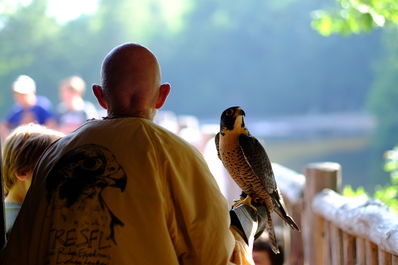
I was talking to two campers by the ping-pong tables this morning, when they suddenly broke conversation and scurried off toward someone else standing not 40 feet away. As they drew closer, they quickly capped their excitement, cautious not to startle the fastest animal on earth: A Peregrine Falcon. Beneath its grip was the gloved arm of Steve Longenecker who has been involved with Falling Creek for decades.
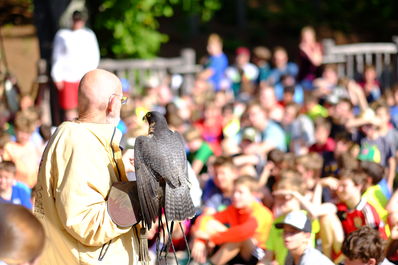
He carried the bird to the porch during Morning Assembly, where a ripple of wonder passed through the crowd, rendering silent more than 400 campers and staff. This was Steve’s introduction of a program called the Falconers of Falling Creek Camp. When he finished speaking, he left quietly and placed the bird, itself a lean column of composure no taller than a quart of milk, into a special crate.
“This all started,” he told me, “in 2008 when I found a camper sitting in front of the enclosures, just staring at the birds, day after day, for quite some time.”
Camp has had birds of prey for several years prior, but the campers themselves were never involved in their care. So, Steve created the Falconer program to involve campers with almost every responsibility of caring for the birds. The only thing they aren’t allowed to do (stipulated by the Steve’s license to operate the program) is hold the birds themselves.
Today, prospective Falconers are gathered on a grassy knoll dubbed “Perry’s Place,” the eponymous location named for Falling Creek’s first Peregrine Falcon, Perry.
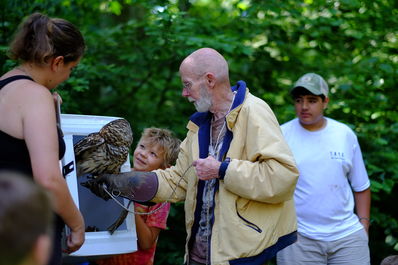
Helped by two Falconer campers from last year, Steve slowly and quietly introduces each bird, ferrying them out with a gloved hand while clasping the leather jesses around their feet. A Screech Owl, a Barred Owl, the Peregrine from earlier, and a small American Kestrel. The campers seated on the knoll were eager, but they soon noticed how Steve behaved around the birds and began to mimic his soft mien, speaking evenly and carrying themselves with deliberate and controlled movements.
All of the birds have some sort of injury or disability preventing them from reentering the wild, but truthfully it’s difficult to notice. All one sees are the glassy, perceptive eyes that peer from their perfect vestment of feathers. Campers walking by on their way to other activities slow their gait, sometimes pausing to look at the birds and take in their presence, even if only for a few moments before carrying on.
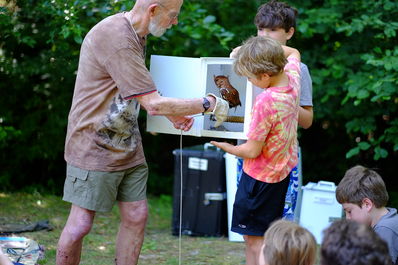
He ushers out the Screech Owl. “You all remember kindergarten, right?” Steve says. “What does the teacher expect you to say when she asks for the sound the owl makes?” The campers murmured in muted unison, “hoo-hoo, hoo-hoo.”
“Well, that’s not the sound this owl makes.” He produced a small device with recorded bird sounds, directing a camper to push the button labeled ‘Screech Owl,’ which gave a noise not at all like what one would expect with a name like that. “It’s not really a screech, is it? That one is called a Treble. The other sound they can make is called a Whinny.”
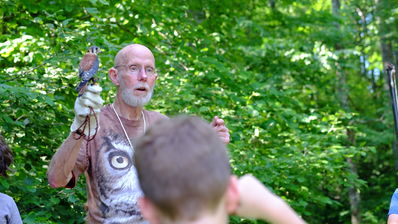
When the birds all had a chance to be looked upon by the young gathering, they were put away into their windowless, stress-free boxes. Some then stood and walked over to the boxes in captive contemplation of the animals waiting within, every bit as curious as the birds perhaps were of the sounds coming from without. Others were asking questions or diving into a crate of books, devouring the images and words.
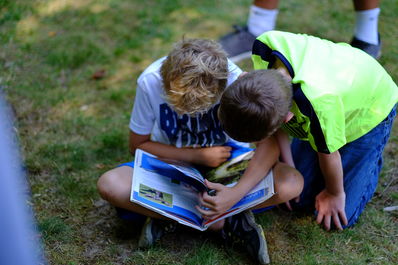
When it was time to move the birds, everyone had some small job to do, some item to carry, whether bird or book, blanket or perch. “Would you two carry this one?” And with the gentlest reverence, the four boxed birds were carried in careful procession past the lakes and down the gravel road, from the Dining Hall to the Nature Center.
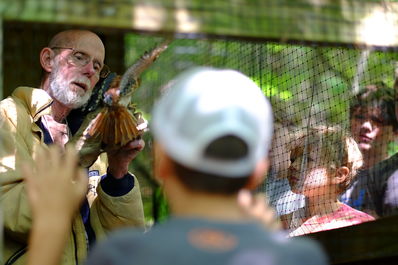
One by one, Steve and the campers installed the birds into their mews, a kind of hutch for these animals, set on the hillside behind the building like the cloistered dwelling of an anchorite. Some of the boys here today will become Falconers of Falling Creek. Steve passed out a written contract of duty to those who were interested and the last of the crowd dispersed.
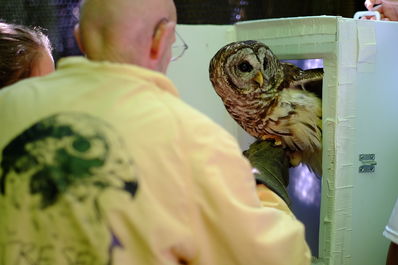
No longer able to hunt in their disabled state, it looks to be that vigils are all these birds can keep nowadays, looking out from their monastic dwellings upon any inquisitive passersby, unwittingly fulfilling their new jobs as installations of education and wonderment. Instead it is a handful of campers who will keep vigil over them, arriving with Steve by morning, noon, and night to feed them or untangle them from their tethered perches, or to see, simply, that they are safe and content.